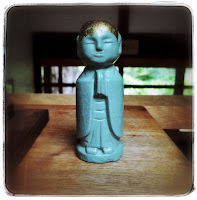For Zen students the most important thing is not to be dualistic. Our "original mind" includes everything within itself. It is always rich and sufficient within itself. . . . If your mind is empty, it is always ready for anything; it is open to everything. In the beginner's mind there are many possibilities; in the expert's mind there are few.Zen is about seeing through the illusion of separation and waking up to the boundless wholeness of all that is. That "wakefulness" is beginner's mind.
I think this is a good philosophy—so far as it goes. And of course by that I mean in our society. Because America, or the West, is all about ego: getting "good" at things, competence, discernment, personal excellence. Even, sadly, being better than others.
There's none of that "we are all Buddha-mind" in this relatively unspiritual country. There could be a lot more of it, heaven knows.
Even among students of Zen, of course, there are "correct" ways of doing things—the forms. You don't want to be sloppy about your bow (gassho), for example.
By bowing we are giving up ourselves. To give up ourselves means to give up our dualistic ideas. . . . Usually to bow means to pay our respects to something which is more worthy of respect than ourselves.
 And so before beginning meditation you bow to the other members of the session, you bow to your zafu or pillow. When you approach the buffet table at mealtime, you bow to the plates; you bow as you sit—to your food and to anyone sitting at the table. When you pass someone on the path, you bow, and they bow also. All out of respect.
And so before beginning meditation you bow to the other members of the session, you bow to your zafu or pillow. When you approach the buffet table at mealtime, you bow to the plates; you bow as you sit—to your food and to anyone sitting at the table. When you pass someone on the path, you bow, and they bow also. All out of respect.Yesterday when we went to the afternoon zazen session, I was very aware of not doing things right. I took my shoes off in the wrong place. I'm sure I crossed the threshold with the wrong foot. I didn't bow to the zendo or to my zafu. Fortunately, I did know enough to face the wall and not out into the room. (We were the first ones in, so had no models to follow.)
After the sit, when we thought we'd be able to leave, we found ourselves trapped into ten minutes of chanting—which I most certainly didn't know how to do. I didn't know how to hold my hands (shashu) as we stood waiting for the priest to signal our prostrations. And the prostrations themselves—how many? hold for how long? hands up or hands down? There ended up being two sets of three (one each for the historical Buddha; for the teaching, or dharma; and for the community, or Sangha), which allowed plenty of opportunity to observe, fortunately. Monkey see, monkey do.
A beginner, though that's not what "beginner's mind" means.
When it came time to chant, I was relieved to see two large stacks of leather-bound books being passed. Most everyone used them, and with good reason: the chants are just nonsense syllables! Okay, not nonsense for serious students. But the texts were presented as syllables, and once my eyes and ears caught up on the page, I was able to participate.
Here, for example, is the start of The Great Sutra of Profound Essential Wisdom and Beyond (which is not what we chanted, but it'll give you the idea): Maka hannya haramita shingyo kan ji zai bo za tsu gyo jin han ya ha ra mi ta ji sho ken go on kai ku do i sai ku yaku sha ri shi . . . et cetera. (That verse means, The Bodhisattva of true compassion, through deep practice in Great Wisdom, understands that the body and the five skandas are only emptiness. And with this understanding, he helps all who suffer.)
You chant in a monotone and get into a more or less even rhythm, becoming one with the larger group. It is a way to experience the self as sound, or maybe more accurately, as part of a bigger sound.
So I've been thinking today about beginner's mind: remaining open and flexible, attentive. I've also been thinking about doing things right (form). And I've been thinking about work, since this is a working farm, but here part of the "work" is also the/a practice. Doing work vs. doing the work; losing yourself in work (presence); working for others (service).
People here seem happy. I believe they rotate from job to job: farm work, housekeeping, cooking, office work. So they don't stagnate, and they get to participate in the larger thing that is Green Gulch, to know all facets of it. That certainly must help cultivate community, Sangha. You're always learning, always interacting with different people.
In an hour is this afternoon's zazen session. I think I'll go. Hopefully I'll do things a bit better than yesterday. And if I make mistakes, I'll just remind myself that I'm a beginner. Always, eternally, a beginner.



3 comments:
what an experience Anne!! .. i would love to partake in something like this at some point . love your sharing!
Just a rich recount of events and the place and your place. Thank you.
Hm. I wrote "such" but "just" appeared. Interesting.
Post a Comment